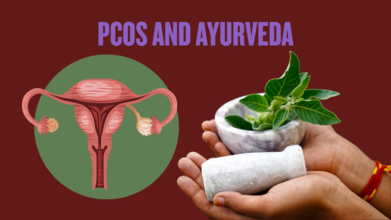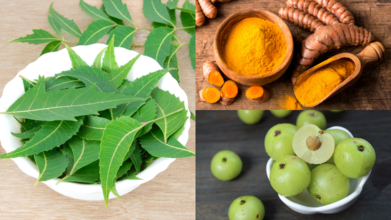- Health Conditions A-Z
- Health & Wellness
- Nutrition
- Fitness
- Health News
- Ayurveda
- Videos
- Medicine A-Z
- Parenting
Why Ayurveda Says Your Morning Tea Should Do More Than Just Wake You Up

Image Credit: Canva
What if your morning tea could do more than just shake off sleep? What if, instead of a quick caffeine fix, it became a ritual—one that aligns your body with nature’s rhythm, fuels your energy, and nurtures your mind?
Ayurveda dictates, mornings aren't simply about waking up; they're about laying the groundwork for the day to come. And what you introduce into your body first matters. Your tea isn't merely a beverage—it's a chance to align your doshas, support your digestion, and welcome clarity into your mind. So, before you grab that sugar-coated, milky mug, let's rethink what your morning tea should actually be doing for you.
As per Ayurveda, dinacharya or daily routine is essential for keeping the body, mind, and spirit in health. Having morning routines not only synchronizes us with nature's rhythm but also helps maintain overall well-being. An Ayurvedic morning routine grounds us for the day ahead, bringing equilibrium between the body's doshas—Vata, Pitta, and Kapha.
Dr. Rohit Sane, an expert in Ayurveda, underscores, "The early morning hours are sacred.". The mind is peaceful, the environment is calm, and the body is spontaneously preparing for the upcoming day. Ayurveda believes that this period, which is called Brahma Muhurta, is an opportunity to harmonize with nature's rhythm." Among the most important Ayurvedic traditions at this moment is beginning the day with a well-selected herbal tea, created to cultivate the body rather than merely waking it up.
In Ayurveda, the various periods of the day are dominated by three doshas:
Vata (2 a.m. - 6 a.m.) – Dominated by air and ether, Vata's energy encourages lightness, creativity, and movement. This is the best time to wake up, cleanse, and practice grounding activities such as meditation and deep breathing.
Kapha (6 a.m. - 10 a.m.) – Earth and water elements predominate, inducing heaviness and lethargy. Waking up after this time can cause drowsiness during the day.
Pitta (10 a.m. - 2 p.m.) – Governed by fire and water, this time increases concentration and productivity, making it the best time for work and solving problems.
Identification of these shifts in energy aids in the organization of a morning regimen that acts harmoniously with the body, not against it.
Why Your Morning Tea Needs To Be More Than Just Caffeine?
While most use customary caffeinated tea and coffee as a starting point for their day, Ayurveda suggests herb teas individualized to the unique dosha. These teas wake up the senses, light up Agni (digestive fire), and revive balance in the body's energies.
Dr. Sane continues, "In contrast to usual tea filled with milk, sugar, and caffeine, Ayurvedic teas employ targeted herbs to balance doshic disarray. The proper tea has the ability to boost digestion, stimulate clarity, and maintain energy without the collapse."
Herbal Tea Blends for Each Dosha
1. Teas for Kapha Dominance
Morning, being Kapha-dominant, has heavy, cool, and slow properties. When unbalanced, these can manifest as sluggishness and lethargy. Ayurvedic teas neutralize this by using warming and stimulating spices.
Best Ingredients:
- Dry ginger
- Black pepper
- Cinnamon
- Tulsi (Holy Basil)
These herbs assist in energizing the body, stimulating digestion, and offering sustained energy levels throughout the day.
2. Teas for Vata Imbalance
Individuals with dominant Vata energy tend to wake up cold, scattered, or anxious. To counteract this, warming and stabilizing herbs are employed.
Best Ingredients:
- Ashwagandha
- Nutmeg
- Licorice
- Cardamom
These herbs create warmth, alleviate stress, and ensure that there is constant energy without overstimulation.
3. Teas for Pitta Dominance
Individuals with a dominant Pitta dosha tend to wake up with a clear mind but can be overheated or cranky. Cooling teas balance excessive heat and avoid mood changes.
Best Ingredients:
- Fennel
- Rose petals
- Mint
- Coriander
These are calm-inducing herbs, easing digestion while cooling the body and clarifying the mind.
Ayurvedic Sutra: Food and Beverages as Medicine
Ayurveda firmly adheres to the principle "Ahara hi param aushadham" or food and drink are the most powerful medicine. A carefully prepared herbal tea, appropriate for one's dosha and season, is not merely a beverage—it's an exercise in self-healing. It boosts ojas (life energy), balances emotions, and aids digestion.
Dr. Sane repeats, "A cup of herbal tea in the morning, selected based on your dosha, is an ancient but effective way to begin the day. It provides clarity, enhances metabolism, and keeps energy levels stable."
How to Add Ayurvedic Teas to Your Lifestyle?
Find Out Your Dosha: Knowing if you are more Vata, Pitta, or Kapha helps in choosing the tea.
Brew with Consciousness: Ayurveda stresses being conscious in every move. Make your morning tea slowly, aware of its medicinal virtues.
Combine with Other Ayurvedic Habits: Follow up your tea with oil pulling, tongue scraping, and breathing exercises for an overall healthy morning routine.
Be Seasonal: Tailor your tea ingredients according to the change in seasons. For instance, winter warming spices and summer cooling herbs.
Morning tea can do more than merely wake you up—it can feed your body, mind, and spirit. The Ayurvedic approach isn't about deprivation but about conscious nourishment, making sure each sip of tea adds to your well-being. So tomorrow morning, ditch the sugar-filled, caffeine-rich brew and try a herbal blend that's specific to you. Your body—and your mind—will thank you for it.
Ayurvedic Navel Oiling: The Best Oils To Choose, The Right Way To Do It And Why It Should Be a Part Of Your Everyday Routine

(Credit-Canva)
In the ancient healing system of Ayurveda, the belly button, known as the Nabhi, is considered a very important spot. It's seen as a central point of energy, health, and balance in the body. Applying warm oil to the navel is a simple but powerful self-care ritual that is believed to bring deep healing benefits to both the body and mind.
In modern science, our belly button holds little to no value, some even considering it a scar, as the only purpose it served was as a source of food for babies in the womb. However, considering it was the only source of nutrition we had, one wonders how it can lose its value outside the womb.
Also Read: What Is Leucovorin - The Drug Trump Suggests As A Treatment For Autism?
According to the California College of Ayurveda, navel oiling practice is based on the idea that the Nabhi is connected to our digestive system, or Agni, and helps spread energy throughout the body. By oiling it, you can nourish your core and bring balance to your body's three energy types, or doshas: Vata, Pitta, and Kapha.
Does Oiling Your Belly Button Actually Have Benefits?
For people who are just learning about this ayurvedic practice, this is the first question they ask. In a video, Smt. Hansa Ji from the Yoga Institute of India explained that the benefits of naval oiling are immense.
For Your Skin: Applying oils like coconut, sesame, or almond oil directly to the navel can help deeply hydrate the skin, making it less dry.
For Digestion: For issues like indigestion, bloating, or stomach pain, a mixture of ginger and peppermint essential oils with coconut oil can be applied. This practice is thought to reduce bloating and strengthen your digestive fire.
For Hormones: Gently warming castor oil and massaging it into your navel is believed to help balance hormones and reduce menstrual pain. For fertility concerns, some people use olive oil or guava leaf oil.
For Detoxification: Using neem or castor oil in the navel may help the body flush out toxins and support liver health.
Some other benefits, as mentioned by the California College of Ayurveda were,
For Pain Relief: A little warm castor oil on the navel may help reduce stomach cramps, menstrual pain, and stiff joints by balancing your Vata dosha.
For Eyes and Lips: Oiling the navel with pure ghee or mustard oil is said to improve eyesight and prevent chapped lips by nourishing your body from its center.
For Fertility: Applying ghee or coconut oil to the navel is believed to nourish the reproductive organs and boost overall vitality.
How to Choose the Right Oil
Different oils have different properties, so you can choose one based on what you want to achieve:
- Coconut oil is cooling and is great for balancing a Pitta imbalance.
- Sesame oil is warming and perfect for a Vata imbalance. It also helps with circulation.
- Mustard oil is known for its cleansing properties and benefits to digestion and joint health.
- Castor oil is a powerful healing oil that can help reduce pain and swelling.
- Pure ghee is very nourishing and helps to rejuvenate your body's tissues.
- Neem oil is great for cleansing and is often used for acne-prone skin or for detoxification.
How to Practice Navel Oiling
To do naval oiling one can start by warming up just 2-3 drops of your chosen oil. You can then lie down comfortably and apply the oil directly into your belly button. You can use a dropper for this.
After you are done putting oil in your naval, gently massage the area in a circular motion for about a minute. Leave the oil on overnight or for at least 30 minutes before you wash it off.
Remember to always use pure, high-quality, cold-pressed oils. If you have sensitive skin, it's a good idea to test a small patch of skin first. You should also avoid this practice if you have any infections or open wounds near your navel.
Adding navel oiling to your daily or weekly routine can have a powerful effect on your overall health, from improving your skin and digestion to balancing your hormones and emotional well-being.
Medical studies that support navel oiling
While studies directly linking naval oiling to health benefits are limited, a 2015 research published in the Asian Pacific Journal of Tropical Biomedicine, showed the usage of essential oils for navel oiling can help reduce stress, headaches, insomnia and muscle pain. Another 2023 article published in the Frontier explains how massaging your abdomen may improve your digestion and improve problems like constipation.
Note: Putting oil in your naval is unlikely to harm you but there are still chances of allergens being present or a specific oil not suiting your skin, causing you irritation. Make sure to do a skin patch test and take guidance from a medical professional for advice.
Can Ayurveda Restore Fix Fertility Issues In PCOS What Doctors Often Miss?

Credits: Health and me
For women grappling with fertility issues or irregular cycles, Ayurvedic practitioners often begin with something that feels surprisingly personal—understanding your prakriti, or unique body constitution. Instead of focusing solely on symptoms, the ancient system emphasizes balance: cleansing the body of toxins, restoring harmony among the three doshas, and gently resetting the system through lifestyle and herbal support. For women with polycystic ovarian syndrome (PCOS), this individualized approach can feel like finally being seen, not just diagnosed.
Conventional medicine has made enormous strides in managing health conditions, but when it comes to PCOS, most treatments stop at controlling symptoms with hormone pills, insulin sensitizers, or surgical interventions. The root causes—sluggish metabolism, chronic inflammation, and stress-driven hormonal chaos often remain unaddressed. This is where Ayurveda steps in, not as a replacement but as a deeper, more integrative path to healing.
“PCOS isn’t viewed only as a hormonal disorder; it’s seen as a reflection of deeper imbalances within the body,” says Dr. Manoj Kutteri, Ayurvedic expert in nutrition, acupuncture, yoga, and physical culture. “These imbalances can affect digestion, metabolism, and even mental and emotional well-being.”
Instead of targeting one hormonal pathway, Ayurveda examines the full picture: how your gut is functioning, whether your body can efficiently remove toxins, and how emotional stress shows up physically. This perspective transforms treatment from surface-level management to whole-body healing.
What Is The Role of Doshas in PCOS?
At the core of Ayurveda lies the concept of doshas—Vata, Pitta, and Kapha. Everyone carries all three, but in different proportions. PCOS is often linked to Kapha imbalance, which manifests as weight gain, irregular cycles, slow metabolism, and excess fluid retention. Still, no two women with PCOS present exactly the same way.
“By identifying your individual balance of these energies, Ayurveda designs a treatment plan that’s personalized to you, rather than relying on a one-size-fits-all approach,” Dr. Manoj explains.
For one woman, reducing Kapha heaviness through lighter, warming foods may bring relief. For another, calming Vata might be more important to regulate cycles and ease anxiety. The process is highly individual.
Detox as a Reset Button
A cornerstone of Ayurvedic care for PCOS is detoxification, or Shodhana Kriya. Unlike fad cleanses, these are gentle, physician-guided therapies aimed at clearing ama, toxic buildup that clogs the body’s channels and disrupts hormonal flow.
“Gentle Ayurvedic detox therapies help get rid of ama, which is built-up toxins that block different channels in the body and throw off the balance of hormones,” says the expert. Panchakarma, a series of cleansing therapies, may be recommended in clinical settings, while at-home practices like drinking warm herbal teas, body exfoliation, and mindful eating, serve as accessible daily rituals.
This cleansing process is less about deprivation and more about renewal. By unblocking energy channels and supporting digestion, detox helps the body find its rhythm again.
Lifestyle as Medicine
Unlike quick fixes, balancing the doshas requires sustained changes across all areas of life. Sleep, food, emotional state, and even how you process stress are all seen as part of the healing process.
“You must implement major, mindful lifestyle changes,” Dr. Manoj notes. “Everything from the type of food you eat to the quality and number of hours that you sleep, how you feel emotionally, how you deal with the stress in your body, and self-analysis, everything comes into the picture.”
Herbs such as Shatavari, Asoka, Punarnava, Guduchi, and Triphala often appear in treatment plans. But Ayurveda never prescribes herbs in isolation—they’re always woven into a broader program of nutrition, movement, and emotional balance.
Daily routines also play a central role. Eating freshly prepared meals, practicing gentle yoga, keeping regular sleep schedules, and cultivating emotional awareness aren’t just lifestyle “tips”; they’re considered medicine.
What Are The Signs of Healing from PCOS?
Ayurveda frames healing as a journey rather than a destination. Women with PCOS may first notice subtle shifts lighter digestion, more energy in the mornings, or a steadier emotional state. Over time, cycles regulate, skin clears, and metabolism steadies.
“Ayurveda encourages women with PCOS to listen and understand their bodies, restore their natural rhythm and harmony, and reconnect with their natural vitality and inner self,” says the expert. This philosophy reframes PCOS not as a lifelong battle but as an opportunity to deepen self-awareness and resilience.
Globally, PCOS has become one of the most pressing reproductive health issues, affecting up to 1 in 10 women of childbearing age. With rising rates linked to lifestyle, diet, and environmental stress, the condition demands more than band-aid solutions. Ayurveda’s individualized, root-cause approach offers a complementary path one that empowers women to take charge of their health and fertility.
What this really means is that Ayurveda doesn’t replace modern medicine, but it fills in the gaps addressing the subtle but crucial links between digestion, metabolism, stress, and reproductive health. For many women, this integrated lens offers both hope and tangible results.
PCOS can feel overwhelming, especially when conventional treatments focus narrowly on managing cycles or insulin resistance. Ayurveda broadens the view, inviting women to see their condition not as a permanent burden but as a signal to restore balance physically, emotionally, and spiritually. Healing isn’t instant, but it is possible, when the focus shifts from suppressing symptoms to nurturing the whole self.
Dr. Manoj Kutteri is a Ayurvedic and wellness expert with a comprehensive background in Mind-Body Medicine, Nutrition, Acupuncture, Yoga, and Physical Culture- Medical Director & CEO of Atmantan Wellness Center in India
Clear Skin in the Monsoon: 5 Ayurvedic Superfoods to Beat Breakouts from Within

Credits: Canva
The monsoon brings with it that dreamy smell of rain-soaked earth, endless chai cravings, and… surprise guests in the form of clogged pores, excess oil, and stubborn breakouts. Humidity and temperature swings are basically a free buffet for acne-causing bacteria. Most of us immediately reach for new face washes or a stronger toner, but according to Ayurveda, you might be missing the most important step, fixing what is on your plate.
“Seasonal changes can aggravate doshas, especially Vata and Pitta during the monsoon, leading to inflammation, acne, and rashes,” says Ayurveda practitioner Dr Madhumitha Krishnan. “Along with skincare, it is essential to bring balance through diet by choosing foods that are sweet in nature and slightly oily, which soothe the body and keep skin issues at bay.”
Here are her top five Ayurvedic superfoods that do more than taste good; they keep your skin glowing even when the weather is a mess.
1. Almonds
If almonds could talk, they would probably brag about how well they can multitask. Primarily sweet in taste and slightly oily in nature, they help balance both Vata and Pitta doshas, making them perfect rainy-season companions. Ancient Ayurveda, Siddha, and Unani texts all sing praises for almonds’ skin-enhancing abilities.
“They nourish the skin from within and maintain dosha balance during humid months,” explains Dr Krishnan. The trick? Soak them overnight. This makes them easier to digest and allows their nutrients to work deeper magic on your skin, keeping it supple and radiant.
2. Turmeric
This golden spice is not just for your grandma’s curries; it is basically edible skincare. Known for its antibacterial and anti-inflammatory powers, turmeric supports digestion (which in Ayurveda is key to skin health) and balances Vata dosha.
By slipping turmeric into your daily cooking, you help reduce the inflammation that often fuels acne. “It purifies the blood, wards off infections, and leaves the skin healthier from the inside out,” says Dr Krishnan. Think of it as the quiet hero who works behind the scenes, preventing those surprise breakouts.
3. Amla
Indian gooseberry, or amla, might be tiny, but it is a tridosha balancer with big skin benefits. It boosts immunity, slows down skin ageing, and helps detoxify the body, all of which lower your risk of monsoon breakouts.
“Amla is one of Ayurveda’s most powerful rejuvenators,” says Dr Krishnan. “Its detoxifying action removes impurities that would otherwise show up on the skin.” Whether you have it as juice, powder, or simply raw with a pinch of salt, your skin will thank you.
4. Neem
If breakouts are the troublemakers at the club, neem is the bouncer at the door. Its antibacterial, antifungal, and blood-purifying properties make it one of the most reliable Ayurvedic remedies for clear skin.
“Neem works by flushing toxins from the bloodstream,” explains Dr Krishnan. Neem juice might not win any taste awards, but it’s a small price to pay for skin that stays calm through the muggy season.
5. Garlic
Garlic might not win you any points in the “fresh breath” department, but it is a skin-saving legend. With its Vata-balancing qualities, it fights inflammation from within and supports overall detox.
Dr Krishnan says, “Many wellness experts recommend eating one raw clove of garlic on an empty stomach; it is a potent way to keep skin and overall health in check.” This practice has even gone viral on social media, proving that sometimes ancient remedies can become modern trends.
If you want to win the clear-skin game this monsoon, do not just attack the surface problem. As Ayurveda reminds us, beauty begins from within, quite literally. By adding almonds, turmeric, amla, neem, and garlic to your diet, you’re not just treating your taste buds; you are giving your skin an internal spa treatment.
© 2024 Bennett, Coleman & Company Limited

